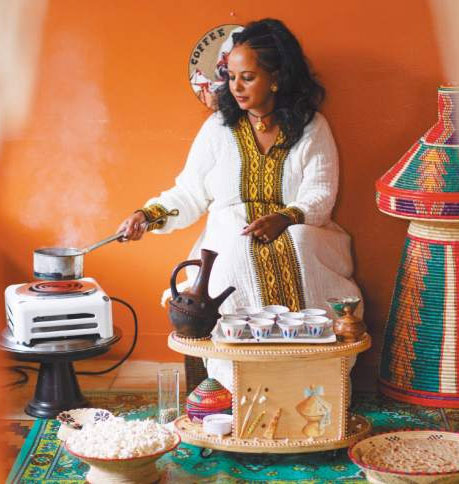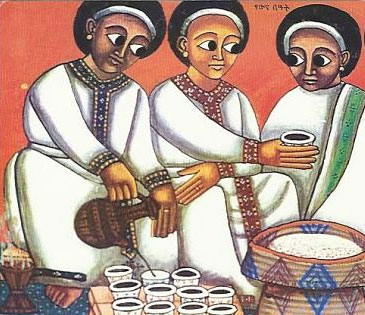Bunna Maflat: The ancient coffee ceremony of Ethiopia

Ethiopia is the hometown of coffee - it is logical that coffee is of particular importance to the locals. Apart from the special flavor of Ethiopian coffee, what makes it stand out is the special, distinct ritual that characterizes it.
What's so special about Ethiopia's Coffee Ceremony?
Ethiopian coffee ritual, or Bona Maflat in Ethiopian, is the cornerstone of coffee culture in Ethiopia and neighboring Eritrea. This is a detailed standard, which defines the roasting, milling, preparation and serving of coffee, giving importance to every detail. No matter how tedious and time consuming, Ethiopian coffee ritual can be repeated two and three times a day, as it is not just a folk tradition, but a special and unique way of preparing and enjoying coffee. The call for coffee in an Ethiopian house is a sign of appreciation, friendship and love, and its refusal can be considered an insult to the host - but a host is considered incomprehensible not to prepare coffee with all the ritual required for his guests. Besides, all of Bona Maflat is structured around the fact that coffee is meant to bring people closer: coffee in Ethiopia is made to be shared among friends, relatives, neighbors and guests.
 How does a Bunna Maflat start?
How does a Bunna Maflat start?
Traditionally, home women or, in some areas of Ethiopia and Eritrea, the country's youngest woman, are going to prepare and serve the coffee. Women who are going to take part in Bunnna Maflat wear a traditional white dress, symbolizing joy and hospitality. The guests are usually sitting on low stools while the floor is perfumed with dried flowers and aromatic herbs. Many times aromatic sticks are burned to drive away the bad spirits and give a special atmosphere to the place.
The guests are gathered around the charcoal grill, in which they will roast and prepare the coffee. After all, the total preparation of coffee is a process that can take up to three hours, in which coffee-sharing people have the opportunity to come closer and discuss issues.
How is coffee prepared according to the Ethiopean Coffee Ritual?
The Ethiopian coffee ceremony employs various utensils, as the preparation of coffee begins literally from scratch. The first step is the roasting of the green coffee beans, done slowly, into a special, wide pan with a long handle. Coffee roasting is considered to be an important part of the ritual, as it shows the guests the freshness of the coffee beans and their quality, and on the other hand the special care needed to prepare the beverage.
 After the roasting of the coffee beans, grinding follows, which is traditionally done by hand, on a wooden mortar with a metal pestle. In the "muzzle", like is the name of the pot, the beans are milled with slow and careful movements until they reach a fine powder. Then follows the main stage of coffee making, which requires another traditional Ethiopian utensil, Jebena: Jebena a clay jug with a very long spout, resulting in a filter made of horsehair or dry grass. The freshly ground coffee is placed in the clay pit, which is filled with water that has, in the meantime, been heated in the fire. With ritual movements, the hostess turns the pot, helping the coffee to be extracted. After a few minutes, the coffee is ready and served in small clay cups. The coffee is extracted three times. The first serving is called Awel, the second Kalel and the third Baraka and is thought to bring good luck and blessing. Although today, the Ethiopians add sugar at will to their coffee, a few years ago it was more common to add traditional Ethiopian butter. Coffee is usually accompanied by a light snack.
After the roasting of the coffee beans, grinding follows, which is traditionally done by hand, on a wooden mortar with a metal pestle. In the "muzzle", like is the name of the pot, the beans are milled with slow and careful movements until they reach a fine powder. Then follows the main stage of coffee making, which requires another traditional Ethiopian utensil, Jebena: Jebena a clay jug with a very long spout, resulting in a filter made of horsehair or dry grass. The freshly ground coffee is placed in the clay pit, which is filled with water that has, in the meantime, been heated in the fire. With ritual movements, the hostess turns the pot, helping the coffee to be extracted. After a few minutes, the coffee is ready and served in small clay cups. The coffee is extracted three times. The first serving is called Awel, the second Kalel and the third Baraka and is thought to bring good luck and blessing. Although today, the Ethiopians add sugar at will to their coffee, a few years ago it was more common to add traditional Ethiopian butter. Coffee is usually accompanied by a light snack.
All of this may seem time consuming and tedious, especially to us, who as Westerners are accustomed to other lifestyles, but they are essentially a special tribute to our favorite drink and how much it can unite and bring together the people who share it . If you are given the opportunity to participate in an ethiopian coffee ceremony, such as an Ethiopian restaurant, do not miss the opportunity - it will be a unique experience. If, on the other hand, you just want the aromas of African coffee in your cup, try a single origin coffee from Africa, such as Illy Monoarabica Ethiopia or Cosmai Dodoma. O Dun, who would also say in Ethiopia!








